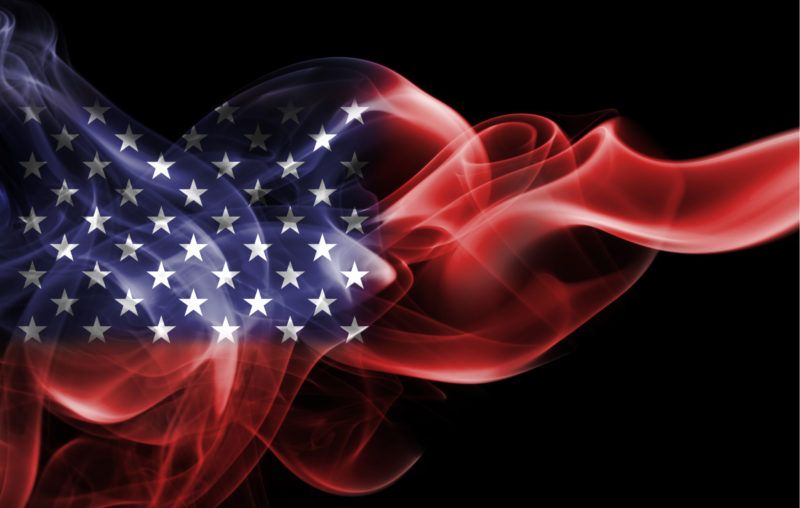So Long Independence?

The Declaration of Independence sought not simply to free most of the mainland North American colonies from increasingly oppressive British rule, it sought to free Americans for all time from all oppressive governments. While much of the document details specific grievances against King George, the second paragraph clearly states “That whenever any Form of Government becomes destructive of these ends [protection of life, liberty, and the pursuit of happiness], it is the Right of the People to alter or to abolish it, and to institute new Government.”
Thomas Jefferson, the lead author of the Declaration, made clear that “Prudence, indeed, will dictate that Governments long established should not be changed for light and transient causes.” But, he continued, “when a long train of abuses and usurpations, pursuing invariably the same Object evinces a design to reduce them under absolute Despotism, it is their right, it is their duty, to throw off such Government, and to provide new Guards for their future security.”
Although it appears during the COVID Spring that America “jumped the shark” on the way to an experiment in “Idiocracy,” it is unclear that Jefferson, Alexander Hamilton, George Washington, or the other Founders, the current state of some of the memorials to them to the contrary notwithstanding, would find the recent train of abuses and usurpations long or focused enough to justify bringing down America’s governments, which today often appear more comically tragic than nefarious.
In fact, independent Americans could literally laugh most politicians right out of office. Just point at them and bust out laughing at all their silly prognostications about masks, medicines, and “nonessential” businesses until they grow ashamed and quit.
In the past, I might have invoked the government’s monopoly on the lawful use of deadly force to explain why a ROLFL/LMAO/LOL revolution has not occurred. But at present many American governments have made clear that they do not want to use any force, much less deadly force, against “mostly peaceful protestors,” and it is difficult to imagine a more peaceful form of protest than uproarious, gut-busting laughter.
Nay, the problem is that most Americans have lost their independence because they are what the Founders called hirelings, not quite slaves but employees not really free to express their political views openly anymore for fear of “cancellation,” or worse.
A big problem with mail-in votes, in addition to the fact that they can be easily de facto sold, is that they may induce people to vote the way their corporate employers signal. Normally, we would expect people who value the secrecy of their ballot to vote in person but this year those fearful of long, potentially covidic lines at polling stations might take a mail-in option instead and some percentage of those will fear retribution at work if they sign a ballot for the “wrong” candidate.
The Founders were sensitive about the matter of voter independence to the point that some state constitutions mandated minimum property requirements for voters. That sounds repugnant to most Americans today but the idea was not to favor the rich per se, it was to ensure that voters were independent of others at a time when voting was not secret and hence subject to outside pressure from landlords or employers.
Jefferson famously fetishized the yeoman farmer as the most virtuous type of citizen but those with a better understanding of economic growth and development, especially Hamilton, thought more in terms of the political independence that stemmed from any form of proprietorship, be it of a farm, artisanal stall, retail shop, or wholesale house.
Oft lauded but at times deprecated, America’s proprietors, the owners of its small business establishments, from “mom and pop shops” to small, closely-held manufacturing companies to professional services providers, have for two-and-a-half centuries (assuming the country can make it to 2026) formed the backbone of local economies, in some instances providing goods where bigger companies will not tread, and in others offering competition against them at crucial margins. While small businesses regularly fail, they create more net jobs than bigger companies do and, in normal times, even failed ones often soon reappear in new and better forms.
Even more importantly, however, America’s proprietors have long provided the voice of sanity in American politics, sometimes acting as individual citizens and sometimes in concert with other proprietors via NGOs like the local chamber of commerce. Small business owners are the people who fight dumb zoning ordinances, opportunity-reducing minimum wage laws, the horrors of rent control, and hosts of other destructive laws and regulations.
Some, like the now famous owner of Atilis Gym in New Jersey, are at the forefront of the lockdown resistance movement, such as it is. America’s proprietors are imperfect protectors of individual liberty (in fact, that very gym was one of the businesses that would not hire my underage “delinquent” son in summer 2019) but they often serve as an effective check against government excesses.
Small business owners have long leaned Republican but they are not overwhelmingly so and, in fact, almost a full third call themselves independent. Regardless of political affiliation, they tend to be moderates because large, rapid, or unexpected policy swings can destroy their businesses and uproot their entire lives. And of course this year two major unexpected policy swings, the COVID-19 lockdowns and privileging the right of assembly over the rights of property owners (residents, travelers, and so forth), have decimated their ranks.
Those big policy changes have already toppled scores of major companies — including Chuck E. Cheese, Hertz, Lord & Taylor, and Men’s Wearhouse — with much better access to emergency credit facilities than most mom and pops, over 100,000 of which had failed by the middle of May according to the Washington Post. By the end of July, more than half the companies listed on Yelp were said to be permanently shuttered.
Doubtless, the richest and most optimistic entrepreneurs will try again at some point but apparently many proprietors have lost all of their capital and any additional stimulus/bailout is likely to be too little, too late for most. Small businesses that fail of their own accord usually take steps to wind down and minimize losses that those suddenly destroyed by being declared “nonessential” during lockdowns or riots simply did not have time to implement. So they did not just cease operations, they failed hard.
In short, America’s proprietors have suffered the same fate the kulaks, Imperial Russia’s version of Jeffersonian yeoman farmers, did during the early years of the Soviet Union, the loss of their businesses and hence their political independence. And we all know how that turned out!
Dekulakization (1929-1932) was Stalin-sponsored and hence far more brutal and deadly than anything America’s proprietors have experienced this year and that may play a role in this November’s election results. In future elections, however, as former proprietors learn to tow the party lines of their new corporate overlord-employers, an important independent political force will have been lost.
The number of Americans losing their political independence will be far from trivial. Before the pandemic, there were about 31 million small businesses (defined as having fewer than 500 employees) operating in America, many sole proprietorships (i.e., owned by 1 person or couple), but some owned in partnership via LLCs or other multi-owner business vehicles. The permanent loss of a third of America’s small businesses, with an average of, say, 3 owners each, means about 30 million independent moderate voices will no longer be well-positioned to oppose extremism from the Left or the Right in America’s public forums.
The fiscal effects of America’s dekulakization may also prove politically destabilizing. Many small businesses are pass-through entities, meaning that their taxes show up as individual, not corporate, income taxation in the aggregate accounts that left-leaning pundits like to show that make it appear that businesses contribute little (7%) to federal government revenues.
In fact, businesses large and small are an essential part of the IRS’s system, paying or collecting 93 percent of all federal revenue. Much of this tax activity will simply shift from failed local businesses to the national chains, like Amazon and Walmart, that manage to survive the ongoing shakeout, but to the extent that small businesses spark new employment or provide services that large companies cannot, or will not, replicate, economic activity and tax collection will suffer.
While a good classical liberal might rejoice at lower tax receipts, everyone needs to keep in mind that this great nation has long been held together by great federal budget deficits that allow the residents of each state, in aggregate, to receive more from the federal government than they pay. That has the sinister effect of hiding a web of cross-subsidization that has kept most Americans fat and happy, if unconcerned about the growing national debt. That web, however, may soon unravel.
More efficiency and transparency would eventually result, but in the short run a lot of Americans would not be very happy as their taxes rise and their government goodie bag shrinks or disappears entirely. There are already multiple secessionist movements afoot and during a serious fiscal crisis a Daniel Day-Lewis movie (Lincoln … or Gangs of New York or There Will Be Blood) could well break out.
America might not become Amerika or the American Reich solely because of the 2020 euthanasia of its proprietor class, but an important check on extremism is fading fast, a fact apparently lost on its self-absorbed political class.










